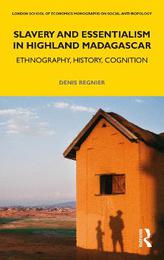
|
Slavery and Essentialism in Highland Madagascar: Ethnography, History, Cognition
Hardback
Main Details
| Title |
Slavery and Essentialism in Highland Madagascar: Ethnography, History, Cognition
|
| Authors and Contributors |
By (author) Denis Regnier
|
| Series | Criminal Practice Series |
|---|
| Physical Properties |
| Format:Hardback | | Pages:224 | | Dimensions(mm): Height 216,Width 138 |
|
| Category/Genre | Slavery and abolition of slavery |
|---|
| ISBN/Barcode |
9781350102477
|
| Audience | | Professional & Vocational | |
|---|
| Illustrations |
5 bw illus
|
|
Publishing Details |
| Publisher |
Bloomsbury Publishing PLC
|
| Imprint |
Bloomsbury Academic
|
| Publication Date |
3 September 2020 |
| Publication Country |
United Kingdom
|
Description
"Unclean people" is a widespread expression in the southern highlands of Madagascar, and refers to people of alleged slave descent who are discriminated against on a daily basis and in a variety of ways. Denis Regnier sets out to explore the prejudice against slave descendants in highland Madagascar and its persistence more than a century after the official abolition of slavery. Regnier shows that the prejudice is rooted in a strong case of psychological essentialism: free descendants think that 'slaves' have a 'dirty' essence that is impossible to cleanse. Regnier's field experiments prove the inaccuracy of the widely accepted idea that the social stigma against slavery is a legacy of pre-colonial society. Regnier argues to the contrary that the essential construal of 'slaves' is the outcome of the historical process triggered by the colonial abolition of slavery: whereas in pre-abolition times slaves could be cleansed through ritual means, the abolition of slavery meant that slaves were transformed only superficially into free persons, while their inner essence remained unchanged and became progressively constructed as 'forever unchangeable.' With fascinating implications, and based on detailed and painstaking fieldwork, Regnier's work will be of interest to anthropologists of Africa, students of international development, and those looking at the legacy of slavery.
Author Biography
Denis Regnier lectures at the University of French Polynesia in Tahiti. He gained his PhD in anthropology from the London School of Economics, UK.
|